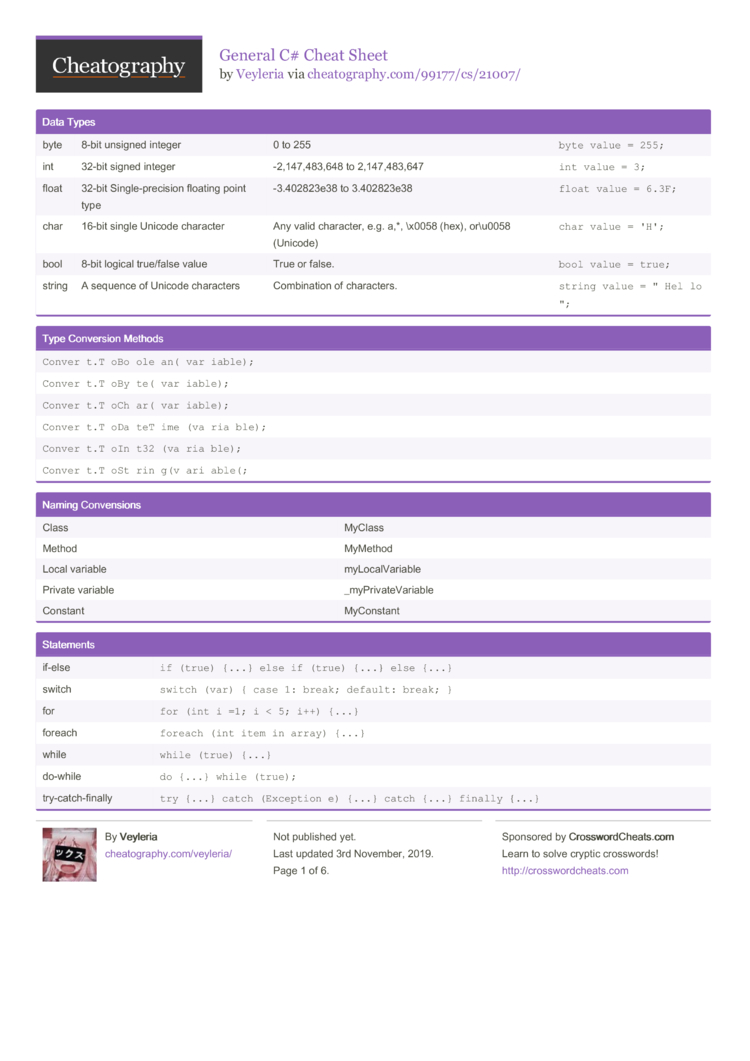In C#, expression-bodied methods are short methods written using a special concise syntax. A method can only be written in expression body form when the method body consists of a single statement or expression. If the body is a single expression, then that expression is used as the method’s return value. The general syntax is returnType funcName(args.) = expression. If there is any problem with the.NET Framework from the C# Programmer’s perspective, it’s just that there is too much good stuff. A lot of classes have so many properties and events that it’s hard to remember what the most used stuff is. Here’s the cream of. This cheat sheet sums up the basics of C#, for experienced developers who are learning C# and users who already know programming basics, hopefully this document has helped you in some way, there was not much information or explaining but then again I’m assuming you’ve.
In C#, members of a class can be marked with access modifiers, including public and private. A public member can be accessed by other classes. A private member can only be accessed by code in the same class. By default, fields, properties, and methods are private, and classes are public. Title: C# Unit-Tests - Basics Cheat Sheet by AlienEngineer - Cheatography.com Created Date: 4240Z.
Data Types
boolBoolean valuebyte8-bit unsigned integerchar16-bit Unicode characterdecimal128-bit precise decimal values with 28-29 significant digits double64-bit double-precision floating pointfloat32-bit single-precision floating pointint32-bit signed integerlong64-bit signed integerobjectBase type for all other typessbyte8-bit signed integershort16-bit signed integerstringString valueuint32-bit unsigned integerulong64-bit unsigned integerushort16-bit unsigned integer
double64-bit double-precision floating pointfloat32-bit single-precision floating pointint32-bit signed integerlong64-bit signed integerobjectBase type for all other typessbyte8-bit signed integershort16-bit signed integerstringString valueuint32-bit unsigned integerulong64-bit unsigned integerushort16-bit unsigned integerType Conversion Methods
ToBooleanToByteToCharToDateTimeToDecimalToDoubleToInt16
 ToInt32ToInt64ToSbyteToSingleToStringToTypeToUInt16ToUInt32ToUInt64
ToInt32ToInt64ToSbyteToSingleToStringToTypeToUInt16ToUInt32ToUInt64Naming Conventions
ClassMyClassMethodMyMethodLocal variablemyLocalVariablePrivate variable_myPrivateVariableConstantMyConstantArrays
int[] array = new int[] {1, 2, 3}int[] array = {1, 2, 3}var array = new int[] {1, 2, 3}int[] array = new int[3]Statements
if-elseif (true) {...}else if (true) {...}
else {...}switchswitch (var) {
case 1: break;
default: break; }forfor (int i =1; i < 5; i++) {...}foreach-inforeach (int item in array) {...}whilewhile (true) {...}do... whiledo {...}
while (true);try-catch-finallytry {...}
catch (Exception e) {...}
catch {...}
finally {...}
Classes
Classpublic class Dog {...}Inheritancepublic class Dog: Pet {...}Constructor (no parameters)public Dog () {...}Constructors can co-existConstructor (one parameter)public Dog (string var) {...}Constructors can co-existFieldpublic string nameStatic Classpublic static class Dog {...}Must only have static membersStatic Memberpublic static int = 1Finalizer (destructor)~Dog () {...}Cannot have modifiers or parametersAccess Modifiers
publicAccessible by any other code in the same assembly or another assembly that references itprivateOnly accessible by code in the same class or structprotectedOnly accessible by code in the same class or struct, or in a derived classinternalAccessible by any code in the same assembly, but not from another assemblyprotected internalAccessible by any code in the same assembly, or by any derived class in another assemblyOther Modifiers
abstractIndicates that a class is intended only to be a base class of other classesasyncIndicates that the modified method, lambda expression, or anonymous method is asynchronousconstSpecifies that the value of the field or the local variable cannot be modifiedeventDeclares an eventexternIndicates that the method is implemented externallynewExplicitly hides a member inherited from a base classoverrideProvides a new implementation of a virtual member inherited from a base classpartialDefines partial classes, structs and methods throughout the same assemblyreadonlyDeclares a field that can only be assigned values as part of the declaration or in a constructor in the same classsealedSpecifies that a class cannot be inheritedstaticDeclares a member that belongs to the type itself instead of to a specific objectC# Cheat Sheet 2020
unsafeDeclares an unsafe contextCheat Sheet C#
virtualDeclares a method or an accessor whose implementation can be changed by an overriding member in a derived classvolatileIndicates that a field can be modified in the program by something such as the operating system, the hardware, or a concurrently executing threadAssignment Operators
=Schedule C Cheat Sheet
Simple assignment+=Addition assignment-=Subtraction assignment*=Multiplication assignment/=Division assignment%=Remainder assignment&=AND assignment|=OR assignment^XOR assignment<<=Left-shift assignment>>=Right-shift assignmentComparison Operators
<Less than>Greater than<=Less than or equal to>=Greater than or equal toEqual to!=Not equal toArithmetic Operators
+Add numbers-Subtract numbers*Multiply numbers/Divide numbers%Compute remainder of division of numbers++Increases integer value by 1 --Decreases integer value by 1
--Decreases integer value by 1Logical and Bitwise Operators
&&Logical AND||Logical OR!Logical NOT&Binary AND|Binary OR^Binary XOR~Binary Ones Complement<<Binary Left Shift>>Binary Right ShiftOther Operators
sizeof()Returns the size of a data typetypeof()Returns the type of a class&Returns the address of a variable*Pointer to a variableClass C Cheat Sheet
? :Oop Cheat Sheet C#
Conditional expressionisDetermines whether an object is of a specific typeasCast without raising an exception if the cast failsAt Amazon you can download the new and expanded C# cheat sheet. It’s called C# – Three-Chapter Cheat Sheet.
It is divided into 3 sections, each section having 4 as listed below. The new version will have almost all of the old content, but I have decided to expand it and add a few new topics in each section as well as expand some topics to be more complete.
Free C# Cheat Sheet (12 pages)
C Sharp Syntax Cheat Sheet
Here below is the downloadable older C# Cheat Sheet from last year, 2019. I had taken it down but now, in August 2020 I’ve decided to put it back up for downloading. It has 12 pages. It’s just over half the size of the one over at Amazon.
